Campus News
This is UCSC
UCSC news and briefs

Six small planets orbiting a Sun-like star amaze astronomers
A remarkable planetary system discovered by NASA’s Kepler mission has six planets around a Sun-like star, including five small planets in tightly packed orbits.
Astronomers at UC Santa Cruz and their coauthors analyzed the orbital dynamics of the system, determined the sizes and masses of the planets, and figured out their likely compositions—all based on Kepler’s measurements of the changing brightness of the host star (called Kepler-11) as the planets passed in front of it.
“Not only is this an amazing planetary system, it also validates a powerful new method to measure the masses of planets,” said Daniel Fabrycky, a Hubble postdoctoral fellow at UC Santa Cruz, who led the orbital dynamics analysis.
Student-run carbon fund fights waste, encourages green
It’s one thing to grouse about food waste, water consumption, and inefficient energy use on campus.
It’s another thing to reach into your own pocket, raise a pool of money and help UC Santa Cruz solve the problem. An enterprising group of UCSC students is doing just that with the newly instituted Carbon Fund, founded last spring to diminish the campus’s carbon footprint with environmentally friendly projects undertaken by staff, faculty, and students.
So far the group has set aside $100,000 for this purpose.
The Carbon Fund uses money raised by Measure 44, a student-approved ballot initiative that raises money through a $3-per-quarter student fee. The fee itself is not new; it has been in place since 2006, when students imposed a previous renewable energy ballot measure. Measure 44 simply redirects that money to the Carbon Fund.
Prof helps in major discovery, wins multiple awards
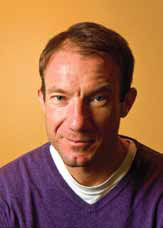
Richard E.
A 30,000-year-old finger bone found in a cave in southern Siberia came from a young girl who was neither an early modern human nor a Neanderthal, but belonged to a previously unknown group of human relatives who may have lived throughout much of Asia during the late Pleistocene epoch.
DNA extracted from the bone has yielded a draft genome sequence, enabling scientists to reach some startling conclusions about this extinct branch of the human family tree, called “Denisovans” after the cave where the fossils were found.
The findings were reported by an international team of scientists, including many of the same researchers who earlier published the Neanderthal genome. Coauthor Richard Green, assistant professor of biomolecular engineering in the Baskin School of Engineering, played a lead role in the analysis of the genome sequence data, for which a special portal was designed on the UCSC Genome Browser.
Green and his coauthors of the landmark paper describing the Neanderthal genome went on to receive the prestigious Newcomb Cleveland Prize from the American Association for the Advancement of Science in February. Also in February, Green received a Sloan Research Fellowship from the Alfred P. Sloan Foundation.
Lit prof’s novel gains notice
Karen Tei Yamashita, professor of literature and co-director of the Creative Writing Program, was nominated for a 2010 National Book Award. Yamashita was one of five finalists in the fiction category for her novel I Hotel.
One of the most significant honors in American literary life, the National Book Awards are presented annually by the National Book Foundation.
For more on Yamashita, see “Brain farm.”
A Writer’s Life
As part of UCSC’s 2011 Day by the Bay weekend, the Humanities Division will host a writing symposium on Sunday, May 1. The symposium will feature UCSC alumni writers— novelists, journalists, and screenwriters—coming together for a community event to focus on the joys and challenges of writing for a living, the business of writing, and trends for the future. The event is called A Writer’s Life: A Celebration of Writing at UCSC.
For information and registration, visit writerslife.ucsc.edu.
Research on thin-film solar cells heats up
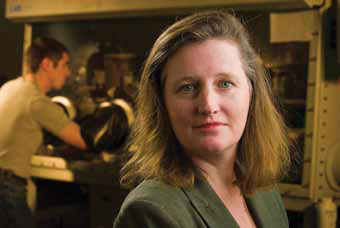
Sue Carter (photo by r. r. jones)
Sue Carter, a UCSC professor of physics, is pursuing a variety of strategies to develop cheaper and more efficient solar cells. She was awarded five new grants last year totaling more than $1 million to fund her research on new materials and technologies for solar energy.
Carter’s research focuses on lowering the cost of solar cells and reducing the energy “payback time”—how long it takes a solar cell to generate the amount of energy that was used to manufacture it. Her lab uses thin-film technologies and printable semiconductor materials that enable the production of solar cells using less material and less energy compared to standard manufacturing processes.
Time’s White House correspondent returns to campus
Michael Scherer, the White House correspondent for Time magazine and a UC Santa Cruz alumnus (Oakes ‘98, creative writing), returned to campus in November to describe his journey from UCSC to riding Air Force One with the president.
Scherer had good news for the creative writing majors who attended his informal talk at Kresge College. “It’s not as gloomy as people tell you,” he said. Opportunities are there “if you are willing to work cheap and really hard.”
He worked for a small New Hampshire daily newspaper for a couple of years, then Mother Jones magazine in a job that didn’t pay enough to live on. A masters in journalism from Columbia University followed, then another stint at Mother Jones, a jump to Salon.com, and finally during the 2008 presidential campaign a call to join Time in covering Republican candidates.
Shakespeare Santa Cruz announces 30th anniversary season
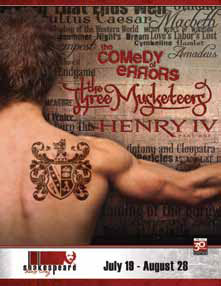
Shakespeare Santa Cruz is preparing to perform its 2011 lineup as the company heads into its 30th anniversary season.
The season will open with an updated version of Shakespeare’s The Comedy of Errors.
Playing in the outdoor Festival Glen will be The Three Musketeers.
Also playing in the Glen will be Shakespeare’s Henry IV, Part One. This will mark the beginning of a three-year cycle of Shakespeare’s history plays known as the “Henriad,” which will continue in 2012 with Henry IV, Part Two, and conclude in 2013 with Henry V.
The holiday show returns in 2011 after a two-year break with A Year with Frog and Toad.
For more information about the 2011 Shakespeare Santa Cruz season, go to shakespearesantacruz.org, or call the UCSC Ticket Office at (831) 459-2159.
John Laird named to key post
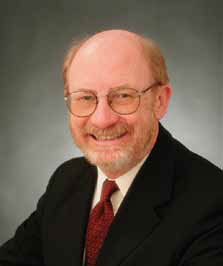
John Laird
John Laird (Stevenson ‘72, politics) is the new secretary of the California Natural Resources Agency, which is charged with protecting the state’s natural, historical, and cultural resources. It is a key position overseeing the state’s environment. He was appointed by Gov. Jerry Brown.
Laird is a former three-term member of the state Assembly, where he served as chair of the Budget Committee. The Alumni Associations of UC named him Legislator of the Year in the Assembly for 2008. He is also a former Santa Cruz mayor, city councilmember, and member of the Cabrillo College board of trustees.
Distinquished history graduate wins prestigious scholarship
Recent graduate Cynthia Thickpenny won a Marshall Scholarship—one of the most prestigious awards that American undergraduates can receive—to study at the University of Glasgow in Scotland.
“I pretty much had to pick myself up off the floor when the phone call came from the British Consulate,” recalled Thickpenny, who studied history.
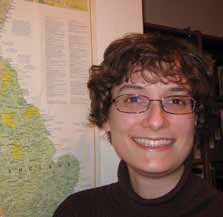
Cynthia Thickpenny
Thickpenny is only the second student in the 45-year history of UC Santa Cruz to be honored with a Marshall; the first was in 1969. The two-year award covers living expenses, tuition, and research travel expenses that come to about $36,000 per year. She plans to specialize in early medieval Scottish history.
Kent Nagano wins Best Opera Grammy
Renowned conductor and UC Santa Cruz alumnus Kent Nagano received a Grammy Award for Best Opera Recording: “Saariaho: L’Amour De Loin” at the 53rd Grammy Awards.
The recording with the Deutsches Symphonie-Orchester Berlin and the Rundfunkchor Berlin features singers Ekaterina Lekhina, Marie-Ange Todorovitch, and Daniel Belcher.
Nagano graduated with degrees in music and sociology in 1974. This is his third Grammy Award.
Alum who died in Tucson rampage honored with scholarship
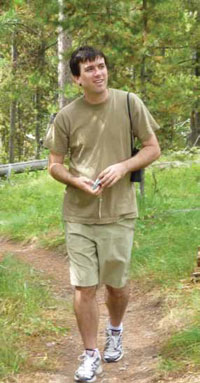
Gabriel Zimmerman, enjoying a walk in Grand Teton National Park in 2009 (photo courtesy of Ross Zimmerman)
Gabriel Zimmerman, community outreach director for Rep. Gabrielle Giffords, D-Ariz., was one of six people fatally wounded in January in Tucson, Ariz., in the shooting rampage that left Giffords critically wounded.
Zimmerman, 30, graduated from UC Santa Cruz in 2002 with a degree in sociology. Friends and colleagues remembered Zimmerman as a seasoned community organizer with a strong sense of social justice and conflict resolution.
“People have to engage,” said sociology professor Paul Lubeck, who vividly remembers Zimmerman’s eager presence in three of his classes. “They have to get out there on the ground, get out into the community, go out and get their hands dirty. He exemplified that.”
The Gabriel Zimmerman Scholarship Fund
Moved by Zimmerman’s death, UCSC alumnus Jonathan Klein established a scholarship fund in the young congressional aide’s honor and offered an initial gift.
In March, the fund exceeded the $50,000 level needed to endow it.
The Gabe Zimmerman Scholarship will provide funds for outstanding students in the Division of Social Sciences who wish to pursue public service.
For information on contributing, contact Marcus Frost at jmfrost@ucsc.edu or (831) 502-7274. You may also donate online; visit giving.ucsc.edu and designate Gabriel Zimmerman Scholarship Fund.
Rod Ogawa wins lifetime achievement award
Rodney Ogawa, professor of education, was named winner of one of the most prestigious awards in the field of education research. Ogawa is the 2010 winner of the Roald F. Campbell award for lifetime achievement by the University Council for Educational Administration. It is “probably the most prestigious award we give in our field,” said Alan Shoho, UCEA president. Ogawa is a former secondary teacher who taught at UC Riverside before joining UC Santa Cruz in 2002. He is a previous chair of UCSC’s education department.
Astronomers find most distant galaxy candidate yet seen
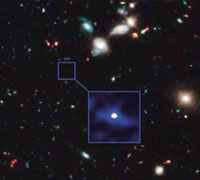
Possibly the most distant galaxy ever seen (image provided by NASA, ESA, Garth Illingworth [UCSC], Rychard Bouwens [UCSC and Leiden University] and the HUDF09 team)
Astronomers studying ultra-deep imaging data from the Hubble Space Telescope have found what may be the most distant galaxy ever seen, about 13.2 billion lightyears away. The study pushed the limits of Hubble’s capabilities, extending its reach back to about 480 million years after the Big Bang, when the universe was just 4 percent of its current age.
“We’re getting back very close to the first galaxies, which we think formed around 200 to 300 million years after the Big Bang,” said Garth Illingworth, UCSC professor of astronomy and astrophysics.
Illingworth and UCSC astronomer Rychard Bouwens (now at Leiden University in the Netherlands) led the study. Using infrared data gathered by Hubble’s Wide Field Planetary Camera 3 (WFC3), they were able to see dramatic changes in galaxies over a period from about 480 to 650 million years after the Big Bang.